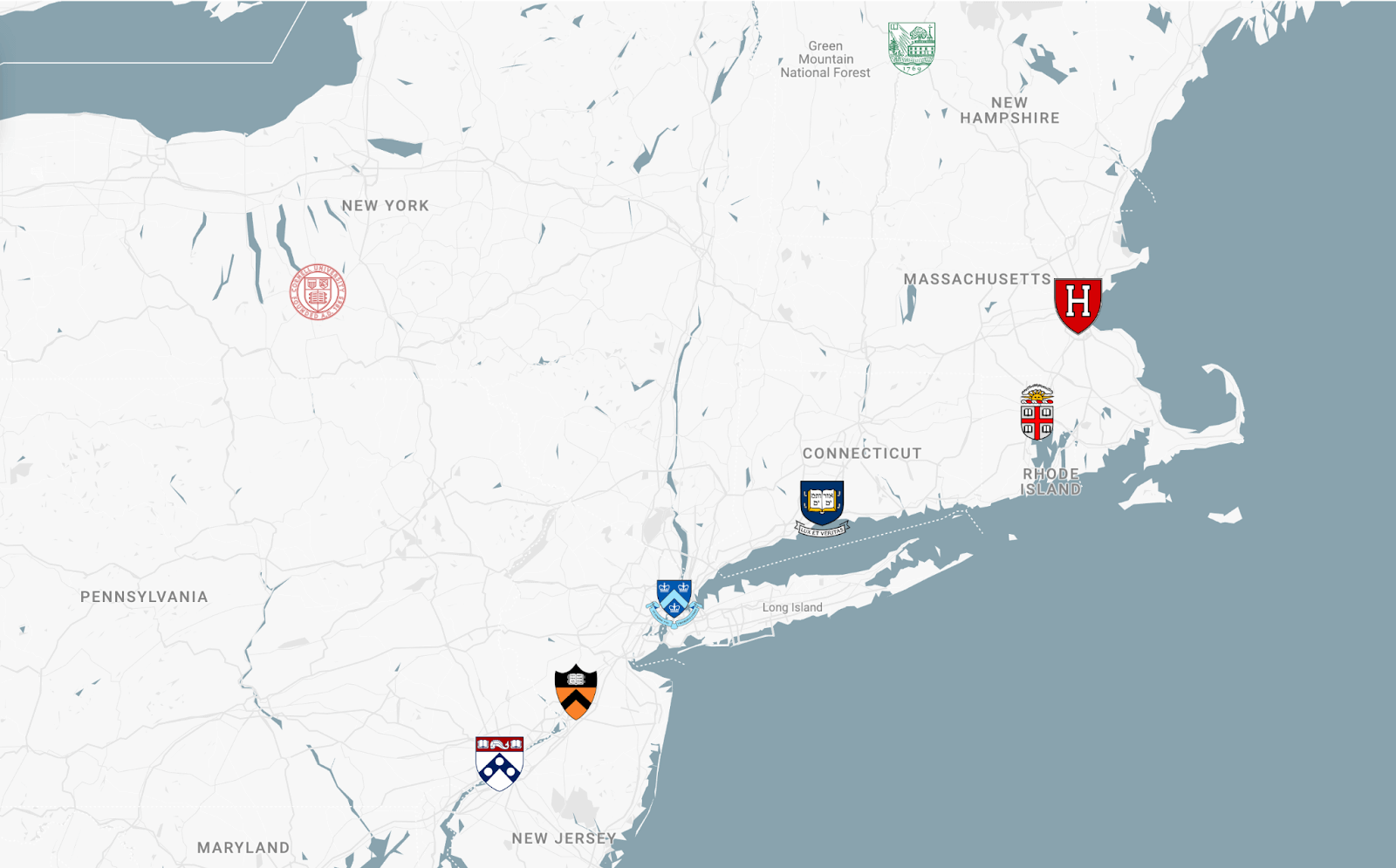Advertiser Disclosure
Last update: December 30, 2024
5 minutes read
Where Are Ivy League Schools Located?
Dive into this comprehensive guide to discover the unique campuses of all eight prestigious universities.

By Derick Rodriguez, Associate Editor
Edited by Brian Flaherty, B.A. Economics
Learn more about our editorial standards



By Derick Rodriguez, Associate Editor
Edited by Brian Flaherty, B.A. Economics
Learn more about our editorial standards
Imagine strolling through centuries-old campuses, each with its own rich history and vibrant community. Let's explore where these iconic universities are located and what makes each one special.

Key takeaways
- The Ivy League comprises eight prestigious universities located in the Northeastern U.S.
- Each school boasts unique features, histories, and academic strengths
- Understanding their campus locations can help prospective students choose the right fit
Ivy League schools and their locations
Before we delve into each university, it's helpful to understand what unites these schools under the Ivy League banner. Originally an athletic conference established in 1954, the term "Ivy League" has become synonymous with academic excellence, selective admissions, and social prestige.
Thus, admission to Ivy League schools is highly competitive. It's important to showcase not just academic excellence but also extracurricular involvement and leadership qualities. While they share a reputation for outstanding education, each institution offers its own unique charm.

Image from: Atlist.
1. Brown University
- Location: Providence, Rhode Island
- Founded: 1764
Nestled in the charming city of Providence, Brown University is known for its open curriculum. This innovative approach gives students the freedom to tailor their education without the constraints of a core curriculum. If you've ever dreamed of charting your own academic path, Brown might just be your oyster!
2. Columbia University
- Location: New York City, New York
- Founded: 1754
Set in the bustling neighborhood of Morningside Heights in Manhattan, Columbia University offers the unique blend of a rigorous academic environment and the endless opportunities of the Big Apple. From Broadway shows to Central Park strolls, studying at Columbia means your classroom extends far beyond campus boundaries.
3. Cornell University
- Location: Ithaca, New York
- Founded: 1865
Perched on a hill overlooking the scenic Finger Lakes, Cornell University boasts the largest campus among the Ivies, spanning over 2,300 acres.
It's not just about size; Cornell offers an extraordinary range of programs, from classics to cutting-edge agricultural and veterinary sciences. Love the great outdoors? The gorges and trails around Ithaca might be calling your name.

TuitionHero Tip
Cornell University was the first U.S. university to offer degrees in veterinary medicine.
4. Dartmouth College
- Location: Hanover, New Hampshire
- Founded: 1769
If the idea of a close-knit community in a quintessential New England town appeals to you, Dartmouth College fits the bill. Known for fostering strong connections between students and faculty, Dartmouth emphasizes a liberal arts education enriched by the natural beauty surrounding it.
Skiing between classes? Totally a thing here.
5. Harvard University
- Location: Cambridge, Massachusetts
- Founded: 1636
As the oldest institution of higher learning in the U.S., Harvard University needs no introduction. Located just outside of Boston in historic Cambridge, Harvard is renowned for its diverse programs and illustrious alumni. Whether you're aiming for law, medicine, or cutting-edge research, Harvard's legacy of excellence is unparalleled.

TuitionHero Tip
Harvard University is so old that it predates the founding of the United States by over a century.
6. Princeton University
- Location: Princeton, New Jersey
- Founded: 1746
Princeton University offers a serene campus vibe with a strong focus on undergraduate education. Its commitment to critical thinking and research means students are encouraged to engage deeply with their studies. Plus, the town of Princeton is the picture of collegiate charm.
7. University of Pennsylvania
- Location: Philadelphia, Pennsylvania
- Founded: 1740
Founded by none other than Benjamin Franklin, the University of Pennsylvania seamlessly blends historic significance with modern innovation. Home to the prestigious Wharton School of Business and the Perelman School of Medicine, UPenn is all about interdisciplinary learning in the heart of a vibrant city.
Compare private student loans now
TuitionHero simplifies your student loan decision, with multiple top loans side-by-side.
Compare Rates
8. Yale University
- Location: New Haven, Connecticut
- Founded: 1701
Yale University's gothic architecture and storied traditions make it a place where history comes alive. Known for strong programs in the arts and humanities, Yale also has world-class music and theater departments. And let's not forget its legendary rivalry with Harvard—school spirit runs deep here!
Statistical snapshot
University | Acceptance Rate | Undergraduate Enrollment | Endowment |
|---|---|---|---|
Brown University | 5.08% | 7,349 | $6.20 billion |
Columbia University | 3.9% | 6,716 | $13.64 billion |
Cornell University | 9-10% | 15,503 | $10.04 billion |
Dartmouth College | 6% | 4,556 | $7.93 billion |
Harvard University | 3.41% | 7,153 | $49.50 billion |
Princeton University | 6% | 5,321 | $34.06 billion |
University of Pennsylvania | 4% | 9,962 | $20.96 billion |
Yale University | 4.35% | 6,536 | $40.75 billion |
Acceptance rates are approximate and can vary by year.
Fun facts about the Ivies
- Having been founded in 1636, Harvard is older than the discovery of calculus, which took place in the late 17th century.
- Dartmouth College inspired the setting for the classic movie Animal House.
- Cornell has its own mythical monster - “Old Greeny,” a Loch Ness-like cryptid said to reside in Cayuga Lake.
Navigating financial aid and scholarships
Attending an Ivy League school is a significant investment. It's essential to understand the financial aid options available, including scholarships, grants, and student loans.
Some students may wonder, Is there a limit to scholarships you can get? Researching and applying for scholarships can greatly reduce your financial burden.

Why trust TuitionHero
TuitionHero provides insights into Ivy League schools, their unique locations, and what sets them apart. We guide students in exploring campus cultures, academic strengths, and financial aid options to help find the perfect fit for their college journey.
Frequently asked questions (FAQ)
Ivy League schools are renowned for their academic excellence, selective admissions, and rich histories. They're consistently ranked among the top universities worldwide, offering unparalleled resources and networking opportunities.
Not at all! While schools like Columbia and UPenn are in major cities, others like Dartmouth and Cornell are located in smaller towns or rural areas, offering a wide range of campus experiences.
Consider factors like location, campus culture, available programs, and extracurricular opportunities. Visiting campuses can provide valuable insights into where you'll thrive.
Absolutely! Ivy League universities welcome international students and offer various resources to support them.
Interested students might ask, Can you get a scholarship as an international student? Many schools offer scholarships and financial aid specifically for international applicants.
Most Ivy League schools require standardized test scores like the SAT or ACT as part of the admissions process. However, some have adopted test-optional policies in recent years. It's important to check the specific requirements of each university when applying.
Admissions are highly competitive, with acceptance rates typically below 10%. Prospective students should focus on academic achievement, extracurricular involvement, personal essays, and letters of recommendation to strengthen their applications.
Final thoughts
From the bustling streets of New York City to the serene landscapes of New Hampshire, the Ivy League offers a diverse array of environments and experiences. Whether you're drawn to the historical grandeur of Harvard or the innovative spirit of Brown, understanding where these schools are located is the first step in finding your perfect college fit.
Source
Author

Derick Rodriguez
Derick Rodriguez is a seasoned editor and digital marketing strategist specializing in demystifying college finance. With over half a decade of experience in the digital realm, Derick has honed a unique skill set that bridges the gap between complex financial concepts and accessible, user-friendly communication. His approach is deeply rooted in leveraging personal experiences and insights to illuminate the nuances of college finance, making it more approachable for students and families.
Editor

Brian Flaherty
Brian is a graduate of the University of Virginia where he earned a B.A. in Economics. After graduation, Brian spent four years working at a wealth management firm advising high-net-worth investors and institutions. During his time there, he passed the rigorous Series 65 exam and rose to a high-level strategy position.
At TuitionHero, we're not just passionate about our work - we take immense pride in it. Our dedicated team of writers diligently follows strict editorial standards, ensuring that every piece of content we publish is accurate, current, and highly valuable. We don't just strive for quality; we aim for excellence.
Related posts
While you're at it, here are some other college finance-related blog posts you might be interested in.
Shop and compare student financing options - 100% free!

Always free, always fast
TuitionHero is 100% free to use. Here, you can instantly view and compare multiple top lenders side-by-side.

Won’t affect credit score
Don’t worry – checking your rates with TuitionHero never impacts your credit score!

Safe and secure
We take your information's security seriously. We apply industry best practices to ensure your data is safe.
Finished scrolling? Start saving & find your private student loan rate today
Compare Personalized Rates


